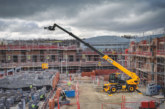 Colin Donnellon, Associate Director of MPW Insurance Brokers, part of the Clear Group, offers his advice to the smaller builder looking for insurance.
Colin Donnellon, Associate Director of MPW Insurance Brokers, part of the Clear Group, offers his advice to the smaller builder looking for insurance.
Post construction, buildings may develop structural defects because of the design, workmanship or materials used in the construction process.
Building Warranties provide protection for major defects, and if an insurance-backed warranty is purchased, the risk is transferred from the parties involved to an insurer. For the smaller developer or speculative builder, purchasing a warranty will offer protection against costly repairs outside of the usual defects period.
Latent Defects or Inherent Defects Insurance derived from the French Civil Code and was first available in France and Belgium in the 1930s. Here in the UK, insurance-backed warranties have been available for a considerable length of time.
Historically, the NHBC has dominated the market for residential warranties. In recent years though we have seen an increase in the number of building warranty providers entering the residential and commercial property sector.
However, the collapse last year of unrated Alpha Insurance A/S, which supplied the insurance required to cover structural defects affecting new homes, has seriously impacted that availability. What’s more, AmTrust International and more recently Canopius in Lloyd’s, have disclosed that they intend to exit the sector entirely. And, it’s likely that other underwriters may signal their intention to follow suit.
That said, the availability of warranties among providers remains strong with new underwriters expected to announce their entry to this sector, offering warranty protection for residential and commercial developments.
Various options are available with specialist underwriters also catering for recently completed buildings/structures and mixed-use developments. For example, cover has been secured for an office block that was built and completed over four years ago.
Good advice and market knowledge is the key to choosing the correct insurer and avoiding unrated insurers. Ideally, a specialist construction broker will have the credentials and experience to offer their client the right choice. It is certainly not a case of one size fits all.
Each provider will have a particular strength and specialism, whether this is for a large project of multiple properties, a single structure for the speculative builder or a renovation or completed building. Without expert advice, making the best choice may be confusing and costly!
When purchasing a warranty, consideration should also be given to lender acceptability. For residential builds, the warranty purchaser will need to ensure that a warranty is provided by an insurer that is accepted by the Council of Mortgage Lenders (CML). The CML has released some helpful guidelines to assist the purchaser in understanding the types of cover, inspection regimes and, ultimately, lender acceptance.
Costs vary depending on the type of warranty – whether that is for the new build, conversion, completed structure or commercial and mixed use. Costs will be determined based on the project, and a specialist construction broker will have the ability to seek out the right choice.
Certainly, there are plenty of options to secure an insurance-backed warranty that offers the required level of protection for an agreed period and at a competitive price.









